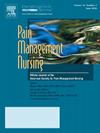Infiltrative Treatment of Morton's Neuroma: A Systematic Review
IF 1.6
4区 医学
Q2 NURSING
引用次数: 0
Abstract
Background
Morton's neuroma (MN) is one of the most frequent neurological pathologies in feet, affecting approximately 4% of the general population. The treatment of MN can be surgical, conservative, and infiltrative, with different substances used in the injections for MN, as steroids, sclerosing solutions, and others. This review aims to evaluate the efficacy of current infiltrative therapy for Morton's neuroma and, additionally, to define adverse effects of this therapy.
Material and Methods
A literature search was performed in PubMed, Embase, CINHAL, Epistemonikos, Web of Science (WOS), SPORTSDiscus and Cochrane Library. This search involved the application of all types of infiltrative treatment applicable to MN. The search was limited to original data describing clinical outcomes and pain using the Visual Analogue pain Scale (VAS) or the Johnson Satisfaction Scale, between February and June 2023.
Results
Twelve manuscripts were selected (six randomized controlled trials and six longitudinal observational studies) involving 1,438 patients. Capsaicin was reported to produce a VAS score reduction of 51.8%. Corticosteroids also reported a high level of efficacy. Alcohol and Hyaluronic Acid injections are well tolerated, but the effects of their application need further research. There were no serious adverse events.
Conclusions
Corticosteroids, sclerosant injections, hyaluronic acid and capsaicin have been shown to be effective in reducing the pain related to MN.
莫顿神经瘤的浸润治疗:系统性综述。
背景:莫顿神经瘤(MN)是足部最常见的神经系统病变之一,约占总人口的 4%。治疗莫顿神经瘤的方法有外科手术、保守治疗和浸润治疗,在注射莫顿神经瘤时使用的物质也各不相同,如类固醇、硬化剂溶液等。本综述旨在评估目前针对莫顿神经瘤的浸润疗法的疗效,并确定该疗法的不良反应:在 PubMed、Embase、CINHAL、Epistemonikos、Web of Science (WOS)、SPORTSDiscus 和 Cochrane Library 中进行了文献检索。该搜索涉及适用于 MN 的所有类型的浸润治疗。搜索仅限于 2023 年 2 月至 6 月期间使用视觉模拟疼痛量表(VAS)或约翰逊满意度量表描述临床结果和疼痛的原始数据:结果:共选取了 12 篇手稿(6 项随机对照试验和 6 项纵向观察研究),涉及 1438 名患者。据报道,辣椒素可使 VAS 评分降低 51.8%。皮质类固醇也有很高的疗效。酒精和透明质酸注射的耐受性良好,但其应用效果还需进一步研究。没有出现严重的不良反应:皮质类固醇、硬化剂注射、透明质酸和辣椒素已被证明能有效减轻与 MN 相关的疼痛。
本文章由计算机程序翻译,如有差异,请以英文原文为准。
求助全文
约1分钟内获得全文
求助全文
来源期刊

Pain Management Nursing
医学-护理
CiteScore
3.00
自引率
5.90%
发文量
187
审稿时长
>12 weeks
期刊介绍:
This peer-reviewed journal offers a unique focus on the realm of pain management as it applies to nursing. Original and review articles from experts in the field offer key insights in the areas of clinical practice, advocacy, education, administration, and research. Additional features include practice guidelines and pharmacology updates.
 求助内容:
求助内容: 应助结果提醒方式:
应助结果提醒方式:


